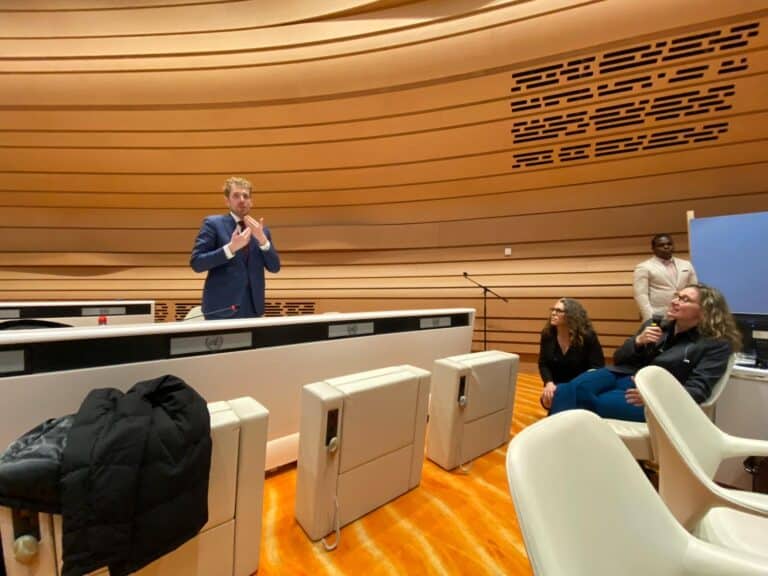On 20 March 2025, the European Union of the Deaf (EUD) participated in the Day of General Discussion (DGD) organised by the UN Committee on the Rights of Persons with Disabilities (CRPD Committee) at the Palais des Nations in Geneva. This meeting was part of the process of drafting the forthcoming CRPD Committee’s General Comment on the rights of persons with disabilities to participate in political and public life, in line with Article 29 of the United Nations Convention on the Rights of Persons with Disabilities (CRPD).
Representing the position of the EUD with the support of the World Federation of the Deaf (WFD), Alexandre Bloxs, EUD Policy Manager, intervened during key panel discussions and highlighted the barriers and challenges that continue to hinder the full and effective participation of deaf people in democratic life either nationally, regionally or globally.
During the panel on electoral participation, we drew attention to the historically low engagement of deaf voters, attributing this to the persistent lack of accessible information. Political party programmes and civic education materials are rarely made available in national sign languages, leaving many deaf people without sufficient knowledge to make informed voting decisions. This information gap has resulted in alarmingly low voter turnout among deaf communities.
In the afternoon session on the participation of persons with disabilities in decision-making related to situations of risks and emergencies, Alexandre delivered another intervention stressing the importance of access to national sign language interpretation in policy consultations related to emergencies and risks. Despite the obvious necessity of such provision, there remain recurring instances of its absence, particularly in national consultations on DRR strategies. This undermines the ability of deaf people to participate in shaping policies that directly impact their safety and well-being.
Furthermore, EUD and WFD raised the critical issue of access for deaf persons elected to parliaments or other public offices. Alexandre underlined the urgent need for clarity regarding responsibility for covering the costs of sign language interpretation—be it the responsibility of the parliament, the government, or political parties. Without this clarification, the meaningful participation of deaf officials remains impeded.
Finally, Ms. Pamela Molina, disability specialist in the Latin American region, called on the CRPD Committee to provide national sign language interpretation to deaf CRPD Committee members and in the interactions they have with deaf representatives. She referred to the World Federation of the Deaf’s press release published on these crucial issues on 20 March 2025 and asked the CRPD Committee to address these.
The EUD welcomes the strong cooperation with the WFD in preparing the joint submission to the CRPD Committee for the drafting of this General Comment. However, we deeply regret the lack of representation of deaf people across the various panels during the Day of General Discussion. Despite the inclusive aims of the DGD, there was a noticeable absence of focus on the specific barriers and requirements faced by deaf people—particularly regarding access to information in national sign languages and the provision of sign language interpretation. Without the presence and interventions of EUD and WFD, the rights and perspectives of deaf people risked being entirely overlooked in the discussions. We nonetheless commend the CRPD Committee and its Secretariat for engaging with our contributions and extend our sincere appreciation to the International Disability Alliance (IDA) for coordinating civil society’s participation throughout the process.
As the CRPD Committee moves forward with drafting the General Comment on Article 29, EUD reiterates its commitment to advocating for the rights of deaf people to political and public participation and ensuring that national sign languages are fully recognised and implemented as a core element of inclusive democratic governance.













